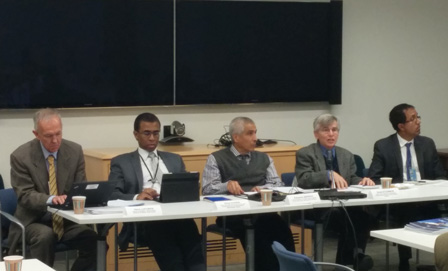UN DESA | DPAD | Development Policy Analysis Division
Capacity Development and Advisory Services
UN-DESA-DPAD
Macroeconomic challenges to development policies post-2015: lessons from recent country experiences
New York, NY
5 and 6 December 2013
 Left to right: Hans Lofgren, World Bank; Elliot Harris, UNEP; Eduardo Zepeda, DESA/DPAD;
Left to right: Hans Lofgren, World Bank; Elliot Harris, UNEP; Eduardo Zepeda, DESA/DPAD; David O`Connor, DESA/DSD; Hamid Rashid, DESA/DPAD.
On 5 and 6 December 2013, an Expert Group Meeting on "Macroeconomic challenges to development policies post-2015: lessons from recent country experiences", organized by DPAD, examined the implications of the global macroeconomic environment on the achievement of a sustainable development agenda and highlighted lessons learned from MDG achievements in a selected number of country studies to assess the challenges that a more ambitious agenda will pose on policymakers.
The first day featured discussions on the global macroeconomic environment and financing a sustainable development agenda as well as three presentations on the macroeconomic challenges in Brazil, China and India. Key messages from these sessions included the idea that the global economic environment is still fragile and economic recovery will continue to be slow. This has the implication that developing countries will find additional difficulties to sustain the social progress made in the previous years of fast growth, as most countries are still facing structural constraints to sustained growth and continuous social progress. In this context, the concept of sustainable development has to be further refined to understand its policy implications in specific country contexts. Financing a sustainable development agenda will be particularly costly while the available resources, including ODA, continue to decline.
In the second day, country teams who participated in DPAD's capacity development activities presented the simulation results obtained in the modelling of the prospects of achieving the MDGs and possible use of this methodology to inform the policy options countries could take to advance an agenda for sustainable development. Several key messages from this discussion include: i) integrating economy-wide, sectoral and micro models to provide a consistent approach in understanding the macroeconomic implications of various policy options, and how these may affect the pursuance of development goals; ii) creating policy advice (at macro, meso and micro levels) that are carefully calibrated to take into account country contexts; iii) building countries' capacity to use analytical tools and modelling; and iv) building synergies across various methodologies, within DESA and across the UN system, which will require careful consideration and a well-defined work plan.
- Official Summary
- Concept Note
- Panel
- Agenda
Agenda and Presentations
The global economy and challenges for achieving sustainable development goals
- World economic situation and prospects - Pingfan Hong, UN-DESA
- The state of the world economy: macroeconomic implications for sustainable development in a post-2015 development agenda - Yilmaz Akyuz
- Macroeconomics for inclusive and sustainable development - Anisuzzaman Chowdhury
Financial challenges for human and sustainable development
- Needs, sources and blended finance: messages from the UNTT working group on financing for sustainable development - Oliver Schwank and David Le Blanc
- Financing challenges for human development and macro-economic trade-offs - Marco Sanchez
- Coherent policies for sustainable development: macroeconomic and structural constrains - Eduardo Zepeda
Recent macroeconomic trends in emerging economies and implications for development
- Country study: Brazil - Eustaquio Reis
- Country study: China - Qija Wei
- Country study: India - Nagapudi Bhanumurthy